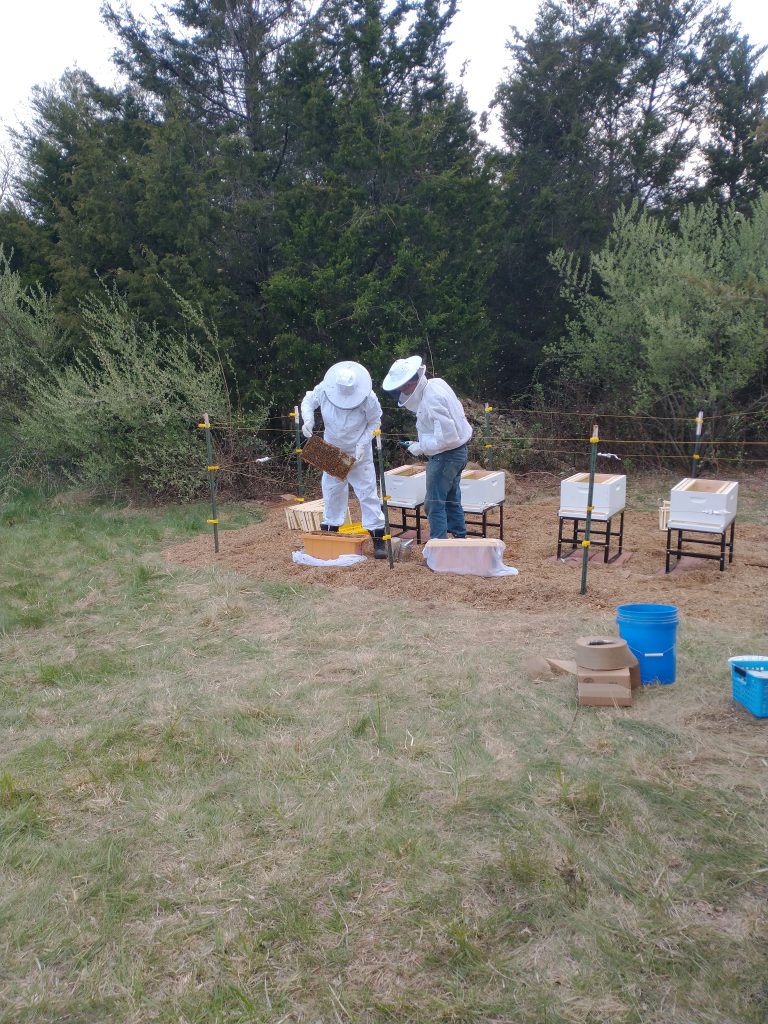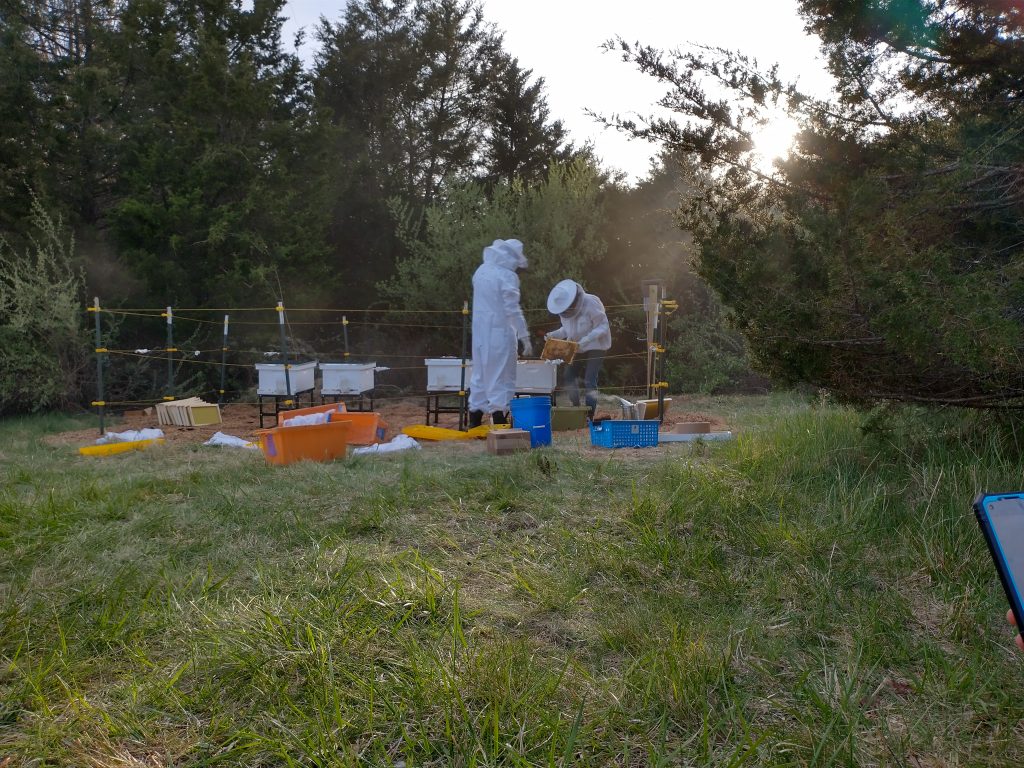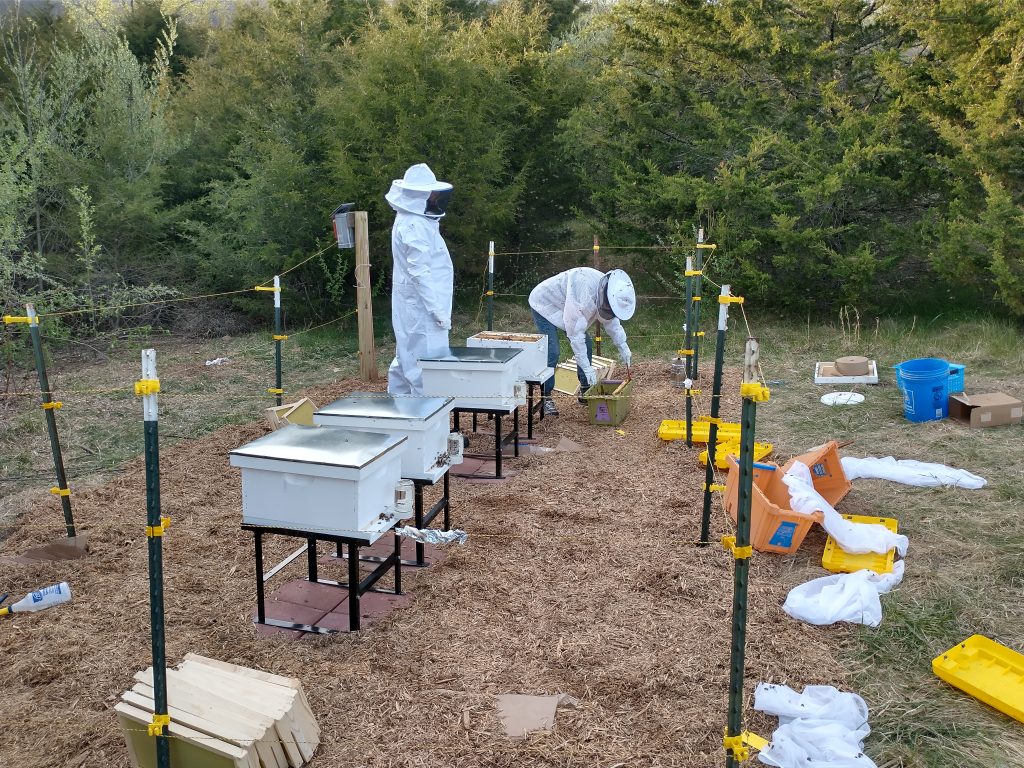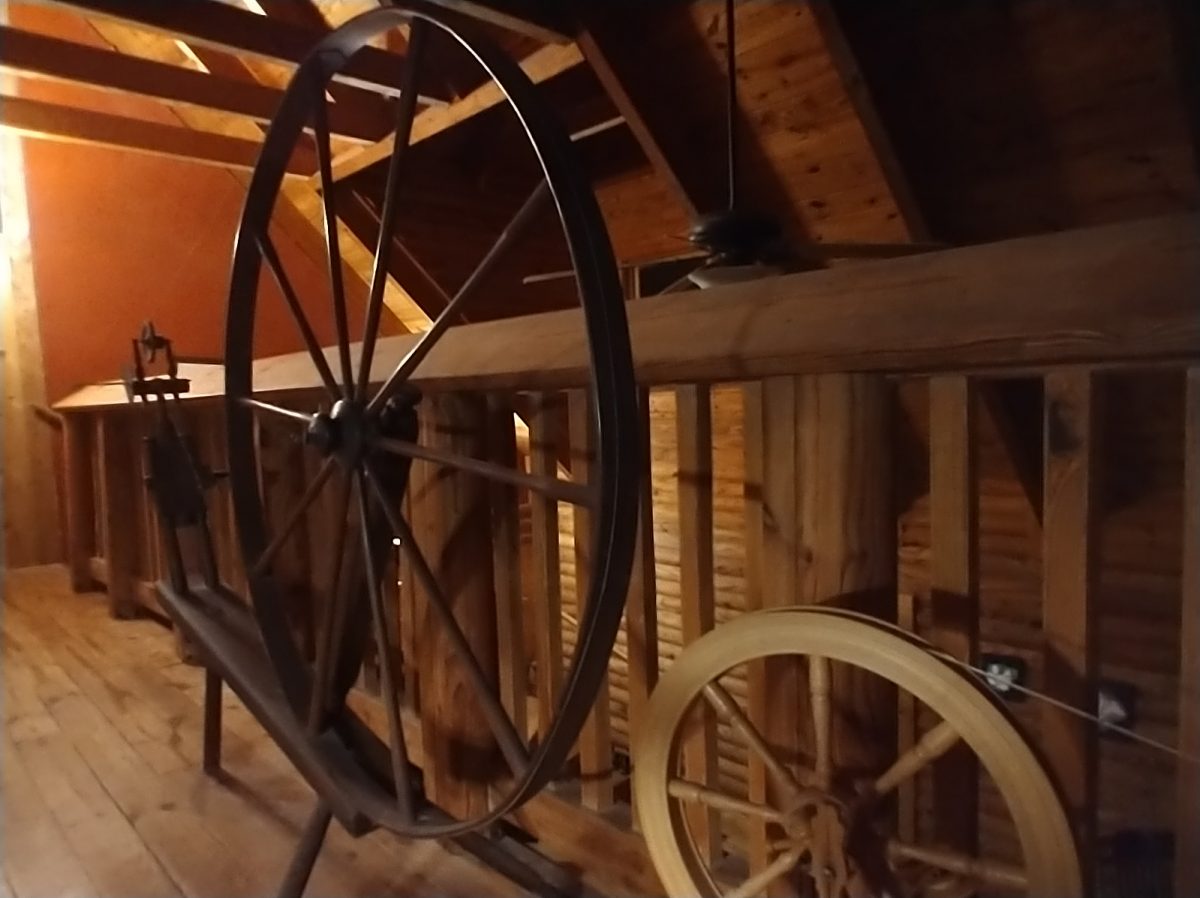Thursday night, Son 1 arrived late and Friday was spent with him, as he made some repairs for us and we all took a walk. Friday in time for dinner, Son 2, a granddaughter , and the bees arrived. We visited, unpacked the pallet of boxes, frames, suits, and other accouterments needed for raising bees, and I found out that the two hives I thought we were starting with was actually 4 hives.
Hubby and I had purchased a post, ground rod, and pavers (for two hives) earlier on Thursday.
This morning, the work began, first pulling a huge pile of Autumn Olive bushes, clearing the space to set up the electric fence to surround the hives, and the guys pounded in poles and dug in the post while I goffered for them and prepped Easter Eve dinner for 10. When the post were set, I strung the electric wire and they determined that the charger wasn’t generating sufficient current to deter bears.
Daughter, her kiddos, her friend and his daughter arrived and we had a scavenger hunt style Easter Egg hunt for the kiddos. The two younger ones had clues from one egg to the next, finally to an Easter basket of mostly crafts. The two teens and Son 1 had escape room type puzzles to solve to move them from egg to egg and finally to their baskets. Son 1’s prize was Easter dinner, a huge spread with lots of delicious food, ham, roast beef, au gratin potatoes, green beans, asparagus, deviled eggs, rolls, and a honey cake with strawberries and whipped topping.
After we gorged, Sons 1 & 2 donned the bee keepers garb and moved two of the nucs down to install two of the hives. I sat at a reasonable distance and watched, one of the nucs had allowed a lot of bees into the net sack around it and that batch was angry, but settled nicely once their queen was in the hive. The second nuc may not be as healthy, though they did find the queen.

Then I got my jacket, gloves, and veil and Son 2 and I installed the third and fourth hives, he did one and showed me, then I did one. They were both healthy hives, though we didn’t see the queen in the last one, there was evidence of one.


These two were much calmer, but wow, what an experience to be setting up the hive with the swarms of bees surrounding you. He has two more nucs to take home tomorrow to set up two more hives there.

Today was great, all three kids, some of the grands, good food, good company, and a brand new experience and addition to the farm.

If you feel your electric fencing is weak on ‘shock’ check you have enough ground rods first. Poor grounds equal weak shock.
I have watched bears defeat fully charged electric fences – sometimes they will simply lift the bottom wire and back themselves under it – while getting shocked. I have bear bangers to fire off as a deterrent. They’re not after the honey – they’re after the brood. The smell of honey is the attraction. During bear season try not to have your hives open for a long period of time – the smell of honey is very strong. When it comes time to extract the honey – be quick to pull the frames to avoid robbing from other bees and do not extract outside – every bee in the land will show up. Don’t even leave a door open while extracting. Good luck with your bees!
Val, thanks for the info. We know our ground rod isn’t far enough in the ground, it is an 8 foot rod only about 4.5 feet down. This county’s main crop is rocks and it is so very difficult to drive anything very deep. The charger is only a 6 V, ordered a 12V strong charge today to be here Tuesday. It is supposed to rain tomorrow, so I will work on trying to drive the rod deeper in wet soil. The bottom wire is 1 foot off the ground, the second about knee to mid thigh on me (5’8″ tall) and the top right at mid chest. The local bee raising gal told me to bait the wire with bacon grease soaked paper towel with aluminum foil holding it on and dangling slightly. What is a bear hanger? We don’t see lots of bears on our property, but we have seen them and they got my bird feeders one night when I forgot to bring them in. I had been warned about extracting outdoors. While we were still setting up fence and bases, we saw several honey bees (ours were still in the garage in nucs and mesh bags) and none of my neighbors have any, but one who moved away did, so we think there may be a wild hive in a tree in the area. The ones we saw were not aggressive. One of the nucs we opened didn’t look very active and son 2 is concerned that it may not make it. If not, he told me to put the box and frames in the freezer until we can get a box of bees sent to us to re-establish that one. I thought he has bought me 2 hives and bees, but he got 4 and bought me the jacket/veil combo and all the tools. I hope it works, it will be an exciting experience. What do you do in winter? Do you cover your hives?
I know beekeepers who bait their wire as you suggest with mixed results. Bears are very clever. Bear ‘bangers’ – they’re about the size of a fat pen, and loaded with a small charge that makes a heck of a noise. You simply point it above the bear, or in it’s general direction and let go of the firing pin (you could probably look these up online, they’re common). The noise sends the bear running. Up here we have enough bear activity I also have a bear tag/hunting license as well.
The hive you’re concerned about – I wouldn’t freeze it, I would requeen it first. Check carefully for eggs in a few days. (Not brood). If you see eggs (it sometimes helps to have the sun at your back) then the queen has been there within the last three days. No eggs- the Queen didn’t make it, or is failing.
Where I live -40C is not uncommon – I insulate and cover my hives. Ask in your area the best methods for winter, there are many ideas that work well. For me – the best chance for bees in the winter – warm, dry, mite free, lots of food.